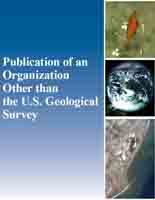Distribution of metals in water and bed sediment in a mineral-rich watershed, Montana, USA
Links
- More information: Publisher Index Page (via DOI)
- Download citation as: RIS | Dublin Core
Abstract
We sampled the Blackfoot River (Montana) and its major tributaries from the headwaters of the basin to near its confluence with the Clark Fork River over the course of 5 days in August 1998. We measured streamflow, collected fine-grained (<63 μm) streambed sediment, and sampled the dissolved (operationally defined as < 0.2 μm) phase of the surface water using clean techniques. Water and sediment collected from near the historic Heddleston mining district contained the highest concentrations of most trace elements in the basin. Many solute trace metals were at their highest several kilometers downstream from the mining district, where the river flows through an unremediated marsh system that has collected mine wastes in the past. Downstream on the headwaters area, water and bed sediment metal concentrations declined sharply. Comparison of sediment samples with those collected by other workers in August 1989 and August 1995 do not show evidence of basin-scale long term changes, despite the onset of remediation efforts in 1993. The area of the proposed McDonald gold deposit near the confluence of the Landers Fork with the Blackfoot River was not contributing anomalous concentrations of naturally-occurring dissolved and bed-sediment metals into the basin.
Suggested Citation
Nagorski, S.A., Moore, J.N., and Smith, D., 2002, Distribution of metals in water and bed sediment in a mineral-rich watershed, Montana, USA: Mine Water and the Environment, v. 21, no. 3, p. 121-136, https://doi.org/10.1007/s102300200033.
Study Area
| Publication type | Article |
|---|---|
| Publication Subtype | Journal Article |
| Title | Distribution of metals in water and bed sediment in a mineral-rich watershed, Montana, USA |
| Series title | Mine Water and the Environment |
| DOI | 10.1007/s102300200033 |
| Volume | 21 |
| Issue | 3 |
| Publication Date | April 12, 2014 |
| Year Published | 2002 |
| Language | English |
| Publisher | Springer Link |
| Contributing office(s) | Denver Federal Center |
| Description | 16 p. |
| First page | 121 |
| Last page | 136 |
| Country | United States |
| State | Montana |
| Other Geospatial | Blackfoot River |


